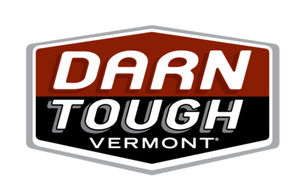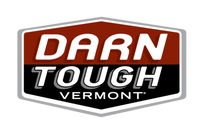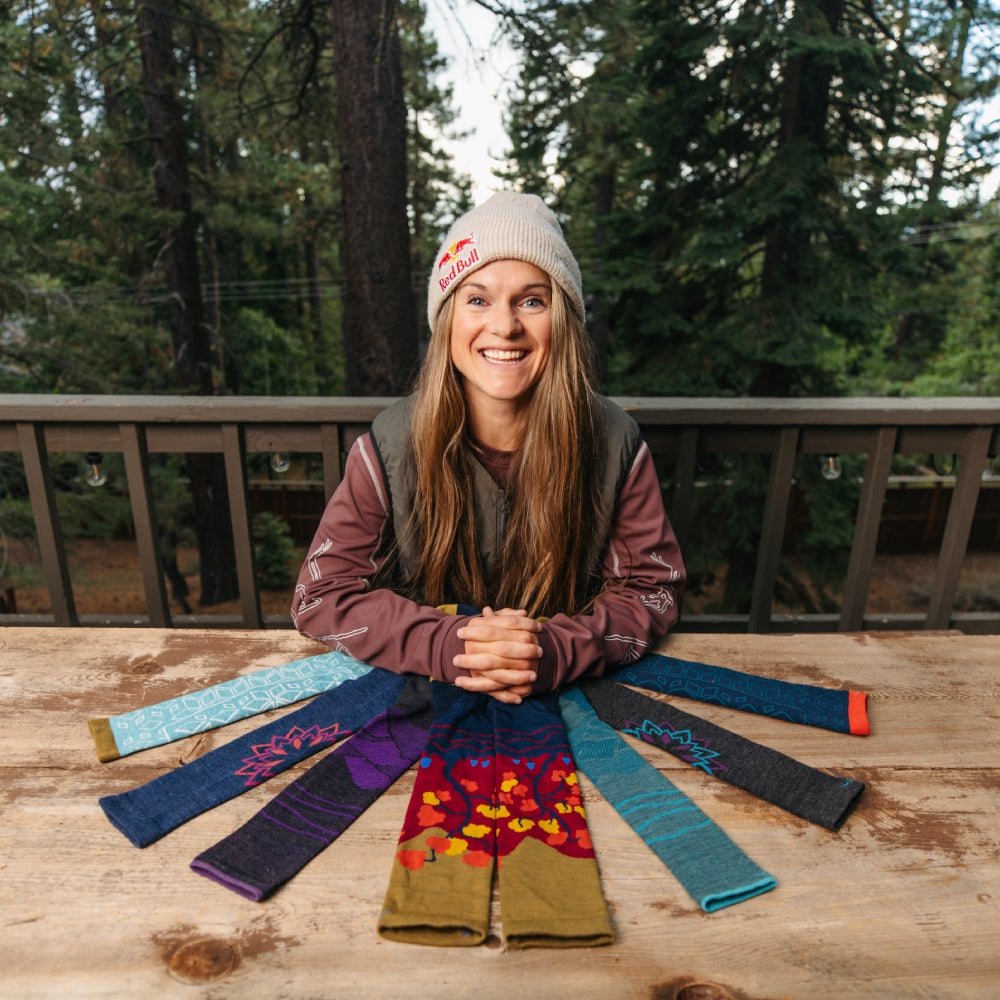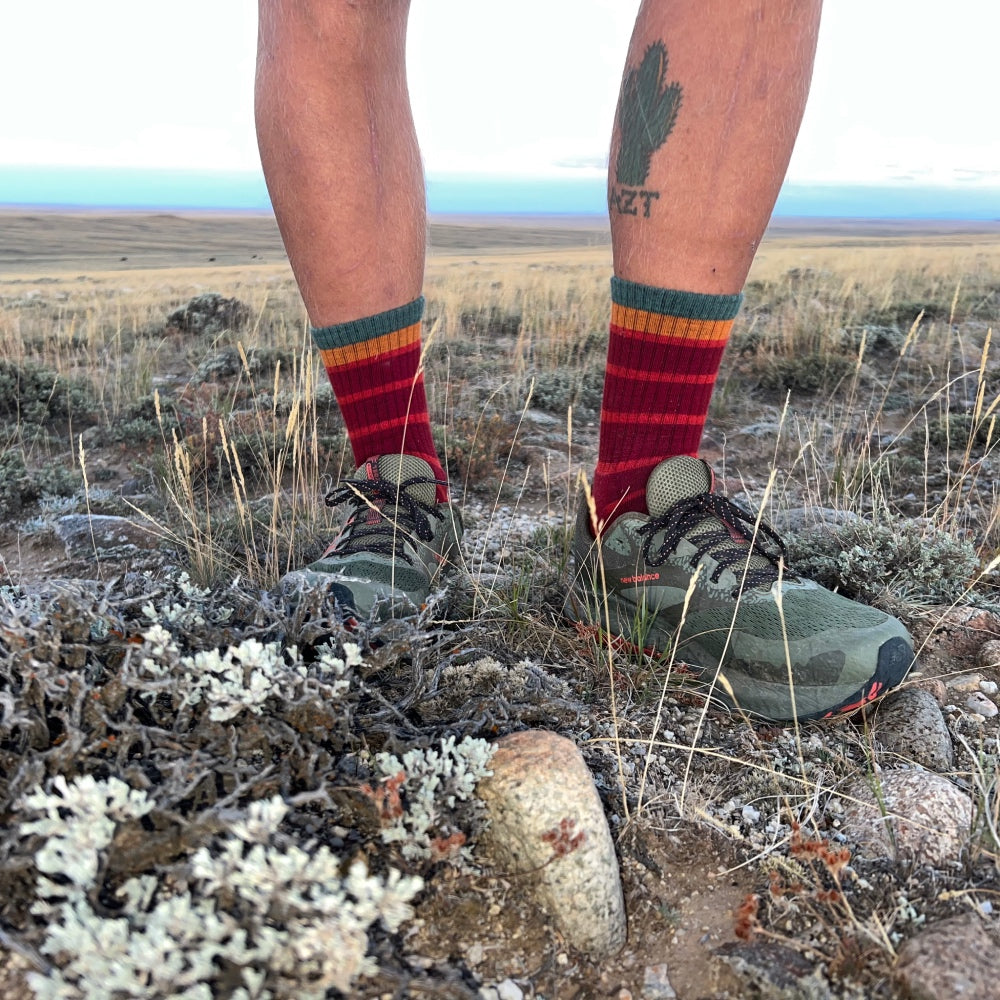What Is the Responsible Wool Standard? Ethical Wool Sourcing

It is I, your Darn Tough Fiber Nerd here to share a little more information about the materials we use in the socks that you know and love.
In my last post, we talked all about wool and the natural, magical properties that it possesses and the benefits it adds to your life. I hope by now you have all gone out and replaced all your clothing with woolen garments.
I would like to dive a little deeper into the world of certifications and how, here at Darn Tough, we try to ensure that the wool that we use in our socks comes from happy, well-cared for sheep and farms that ensure their workers have fair and equal working conditions. When it comes to our wool, we follow the Responsible Wool Standard (RWS).
What exactly is RWS, you might ask?
What Is the Responsible Wool Standard?
The RWS is a global standard that addresses the welfare of sheep and the land they pasture on. Developed by the Textile Exchange, a non-profit organization that promotes sustainability in the textile industry, the RWS standard is a wholistic approach, considering the entire supply chain from the farm to the final product.
Let's unwind this a little bit more…
Food & Water, Healthy Land, & Happy Farmers

RWS sets strict requirements focusing on three main areas:
- Flock welfare, such as ensuring that sheep have access to clean water and adequate food and are not subjected to mulesing.
- Land management, requiring that farms use responsible land management practices, such as minimizing the use of pesticides and reducing soil erosion.
- Social welfare of the farm hands, taking into account the working conditions and safety of the workers.
Mulesing & Flystrike
Mulesing is something that is specific to animals that can be used to produce fiber. Mulesing is a terrible practice in which the rolls of skin are removed from the sheep's wooly hindquarters to prevent flystrike.
One feature of the Merino Sheep is that it can develop rolls of skin that are covered in dense fleece. If the sheep are cared for properly, it means more wool, but it does mean that they are more susceptible to flystrike.
Flystrike is when the fly (specifically a blowfly) lay eggs deep into the moist folds of the Merino’s wooly hind quarters. The larva of the fly then lives off the fiber of the sheep, creating painful wounds which can lead to death in some cases.
Not nice at all. Mulesing is a quick and cruel way to ensure that you don’t have to deal with flystrike, and unfortunately it is a common practice on non-certified sheep farms, especially when it comes to Merino sheep in specific parts of the world.
With proper flock management (rotational pasturing, shearing early enough to not overgrow your fleece, regular herd checks) and observant shepherds to catch flystrike in time, there is no need for mulesing.
Clean Processing

After the wool leaves the farm, the RWS requirements follow the raw wool through processing, prohibiting the use of certain chemicals and requiring the responsible treatment of wastewater before it is released into the environment.
RWS also requires that the workers in these processing plants are treated fairly and have safe working conditions.
Why Do We Need RWS?
Some might ask, why are certifications like RWS so important to companies and their supply chains?
Consider this from another perspective. When you walk into a grocery store, you (the customer) have the ability to choose to buy food that is certified organic or conventional. If you have dietary restrictions, you can look at the label and see if something is gluten-free, sugar-free, or kosher.
All of these products have been certified so you don’t have to take the time to read the ingredient lists and worry that you might eat something that isn’t suited for your body.

The fashion industry (from fast fashion and high fashion to the outdoor gear industry) is working to do the same. Certifications such as RWS are important because they provide a way for consumers to make informed choices about the products that they buy.
When you see that little label that says RWS or Certified Organic, it means that an independent third-party organization has verified that this product meets certain standards and was produced in a responsible and ethical manner.
Transparent Supply Chains
Another word for the above is transparency. You might have heard of it in this context before now, but if this is your first time hearing about a transparent supply chain, allow me to give a brief explanation of why it is so important.
Transparency is crucial for all businesses, but keeping this in the world of socks, having a transparent supply chain allows customers to trace the journey of a sock from the farm to their feet.
This level of transparency and certifications encourage companies to improve their practices, and by setting standards and requiring certifications, organizations like the Textile Exchange can help drive positive change in the industry.
So Where Is Darn Tough in Becoming an RWS-Certified Company?

You might recall that at the beginning of this post, I said, “When it comes to our wool, we follow the Responsible Wool Standard (RWS).”
Follow is the keyword there. We are currently one final step away from being a RWS-certified company.
Currently, 85% of the wool we source to knit our socks is RWS certified. The remaining 15% of our wool that is not RWS certified is used for Tactical socks. The material for these socks must be Berry Compliant (BC).
All materials used in a BC product must be sourced from the United States, as laid out by the Berry Amendment. As of today, there is very limited RWS-certified wool in the US, and there is little-to-no US Merino Wool that is RWS compliant. But never say never...

The final step of becoming an RWS-certified brand happens here in Vermont, when the yarn is brought into our warehouse and threaded up on our machines. For every sock we knit with RWS wool, we need to have a clear path from receiving the cones of yarn to where our finished socks are stored and packed to be mailed out to you, our loving customers.
We need to prove that we are actually using this RWS yarn and not just saying we are. That might sound simple, but what it looks like for us is updating our operations from start to finish, which is a multi-year project we are developing a roadmap for.
Once we are certified, every year an auditor (with a direct connection to the Textile Exchange) will come in and evaluate our process and each of our facilities and make sure that we are doing our due diligence so you the customer can feel at peace when sliding your toes into your fresh wooly socks.
Back to the present, we are currently in the process of getting our ducks in a row to get all of our facilities approved and certified, and trust me… when we have it you will know!

Support Responsible Supply Chains
As this chapter comes to an end, I want to encourage you all to learn more about where your clothing comes from and the other certifications that exist out there. RWS isn’t the only wool certification out there, but it’s the one that makes sense for us and our product.
For more information about the Textile Exchange and other certifications for responsible fibers practices (cotton, down, recycled nylon, recycled polyester) please visit their website.
This same theory of having a transparent supply chain can be applied to every item that you buy. Dig around on the company's website and see if they have a section about where their product is made, who makes it, and what it's made of. Scroll to the bottom of the page and see if they list their certifications and also who is a supporter of their company.
Each company has its own version of transparency, some are clean and easy to follow, and some might be a little muddier to work out. As consumers, we have the power to decide if a company deserves our hard-earned money and support.
And with that, I will step off my certified organic, RWS, non-GMO, gluten-free soap box and bid you all ado.
Be well. Be warm and shop wisely.
Warmly,
Darn Tough's Fiber Nerd

About the Author
The Darn Tough Fiber Nerd is one of many on a team that cares about where our wool and other materials come from, and this Fiber Nerd hopes they have relayed this information kindly and accurately. They wrote this blog post in their home with 5 different animals trying to climb into their lap and get some scratches. It was a struggle.







